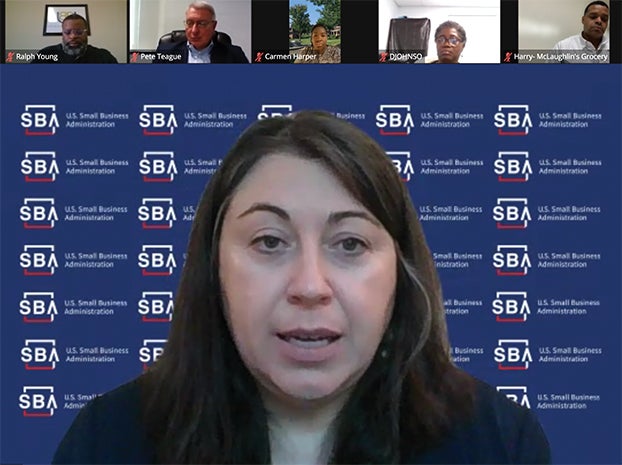NC Small Business Administration official talks to Rowan Chamber about pandemic help
Published 12:05 am Wednesday, October 20, 2021

- Aregnaz Mooradian, deputy director for the North Carolina District of the SBA, spoke to members of the Rowan Chamber's Minority Business Council on Tuesday morning.
SALISBURY — With the country’s small businesses reeling from the effects of the COVID-19 pandemic, Aregnaz Mooradian says the U.S. Small Businesses Administration has been working diligently to facilitate much-needed relief.
Mooradian, deputy district director of North Carolina’s SBA Office, joined the Rowan County Chamber of Commerce’s virtual Minority Business Council meeting on Tuesday morning to discuss what those efforts have looked like in the Tar Heel State.
“SBA has been really busy,” Mooradian said. “We started off with the Paycheck Protection Program about a year and a half ago, which really the purpose was to help with small business relief, help small businesses covering their payroll.”
Mooradian said the SBA was “designing the plane while flying it” as it partnered with local banks and lenders to administer the forgivable PPP loans. Through the program, which is now closed, the SBA distributed $18 billion in funding to businesses in North Carolina. Mooradian contrasted that with the roughly $1 billion in emergency relief funds the SBA administers in a normal year.
“That was pretty monumental,” Mooradian said.
The North Carolina District of the SBA is headquartered in Charlotte, but it also maintains satellite offices in Raleigh, Wilmington and Asheville.
Mooradian also discussed several other disaster relief programs spurred by the pandemic, including the Shuttered Venue Operators Grant and the Restaurant Revitalization Fund as well as the SBA’s Emergency Injury Disaster Loan. The EIDL program, which received criticism over delayed service and transparency from some federal legislators, is still open and accepting applicants.
The EIDL loan program doesn’t disperse forgivable loans like PPP program, but Mooradian said the 30-year interest rates are between 2.75% and 3.75% depending on the business. The first payment on loans made in 2021 will have a due date of 18-months from the date of the note.
Harry McLaughlin, owner of McLaughlin’s Grocery near Livingstone College, told Mooradian it took him just two weeks to receive an EIDL loan.
After providing information on the SBA’s pandemic-related resources, Mooradian turned her attention to more SBA programs that will be available after the pandemic subsides. She focused on those that could prove especially helpful to minority small businesses, such as the SBA’s 7(a) and 504 loan programs.
The SBA, Mooradian said, can work with local lenders to help small and minority business owners secure loans they otherwise might not be able to. More information about government-guaranteed lending can be found online at sba.gov/funding-programs.
Mooradian also encouraged minority business owners tuned into the meeting to seek out certifications through the SBA. By becoming certified as a women-owned or veteran-owned business, owners will have a greater opportunity to compete for federal contracts. The certifications can help smaller, disadvantaged businesses increase their revenue streams by selling to the federal government, Mooradian said.
“The government spent upwards of $700 billion (last year) on goods and services. So, basically 23% is required to go through small businesses,” Mooradian said. “The government does that by setting aside contract opportunities specifically for those small and disadvantaged businesses to bid on.”
Rowan Chamber President Elaine Spalding and Minority Business Council Chair Elia Gegorek said the council would discuss hosting workshops to help local small businesses become certified by the SBA.
Mooradian told those attending the SBA provides counseling to small business entrepreneurs. The SBA does this primarily through its SCORE business mentoring program, which is free and connects owners with mentors who have area-specific knowledge. More information about the SCORE program can be found online under the “local assistance” at sba.gov.
Esther Atkins-Smith of Candlelight Consultants asked Mooradian if there is a way for minority business owners to provide feedback to the SBA. Atkins-Smith said the process to apply for aid can be long and arduous, particularly for small business owners who are already pressed for time.
Mooradian encouraged any business owners who have feedback to visit the SBA’s Office of Advocacy page, which has contact information for staff members who oversee various programs.
On the heels of Hispanic Heritage Month (Sept. 15 – Oct. 15), Gegorek took a few minutes to highlight the significance of Hispanic businesses in Rowan County.
“This community brings a lot to us,” Gegorek said. “They bring work, labor force, but again they do have a lot of businesses in our community. We have construction, we have remodeling, we have stores, we have food trucks and I bet you all have enjoyed that.”
The next Minority Business Council meeting will be held on Nov. 16 at 9 a.m. via Zoom. The speaker will be Trina Fonville from The Benefit Center.
More information about the EIDL program can be found online at sba.gov/funding-programs/loans/covid-19-relief-options/eidl.
More information about government contracting and certifications can be found online at www.sba.gov/federal-contracting.





